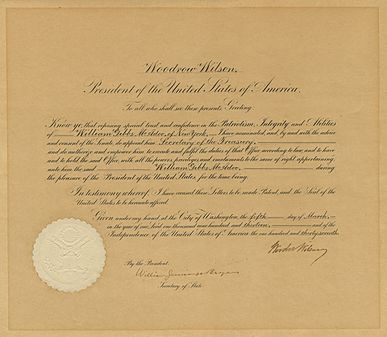William Gibbs McAdoo facts for kids
Quick facts for kids
William McAdoo
|
|
|---|---|
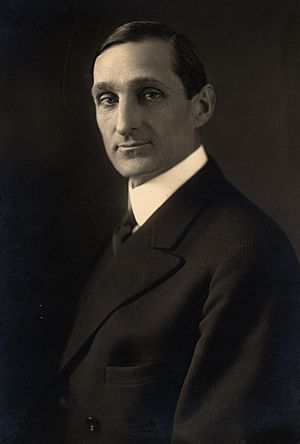
McAdoo in 1914
|
|
| United States Senator from California |
|
| In office March 4, 1933 – November 8, 1938 |
|
| Preceded by | Samuel M. Shortridge |
| Succeeded by | Thomas M. Storke |
| 46th United States Secretary of the Treasury | |
| In office March 6, 1913 – December 15, 1918 |
|
| President | Woodrow Wilson |
| Preceded by | Franklin MacVeagh |
| Succeeded by | Carter Glass |
| Personal details | |
| Born |
William Gibbs McAdoo Jr.
October 31, 1863 Marietta, Georgia, C.S. |
| Died | February 1, 1941 (aged 77) Washington, D.C., U.S. |
| Resting place | Arlington National Cemetery |
| Political party | Democratic |
| Spouses |
Sarah Hazelhurst Fleming
(m. 1885; died 1912)Eleanor Randolph Wilson
(m. 1914; div. 1934)Doris Cross
(m. 1935) |
| Children | 9 |
| Education | University of Tennessee, Knoxville (BA) |
William Gibbs McAdoo Jr. (October 31, 1863 – February 1, 1941) was an American lawyer and important government official. He was a key leader in the Progressive movement, which aimed to improve society. McAdoo played a big role in the government of his father-in-law, President Woodrow Wilson. He was also a member of the Democratic Party and served as a Senator for California.
Born in Marietta, Georgia, McAdoo moved to Knoxville, Tennessee when he was young. He later graduated from the University of Tennessee. He started his law career in Chattanooga, Tennessee before moving to New York City in 1892. He became well-known as the president of the Hudson and Manhattan Railroad Company.
McAdoo helped President Wilson win the 1912 presidential election. After Wilson became president, McAdoo served as the United States Secretary of the Treasury from 1913 to 1918. He married Wilson's daughter, Eleanor, in 1914. McAdoo helped create the Federal Reserve System, which manages the nation's money. He also helped prevent a financial crisis when World War I began. During the war, he also managed the country's railroads.
After leaving Wilson's team in 1919, McAdoo started a law firm. He tried to become the Democratic candidate for president in 1920 and 1924 but did not win. In 1932, he was elected to the Senate but lost his re-election bid. McAdoo passed away in 1941.
Contents
Early Life and Career Beginnings
William Gibbs McAdoo Jr. was born during the American Civil War in Marietta, Georgia. His father, William Gibbs McAdoo, was an attorney and a professor. His uncle, John David McAdoo, was a general in the Confederate army. William Jr. went to country schools until his family moved to Knoxville, Tennessee, in 1877. There, his father became a professor at the University of Tennessee.
McAdoo graduated from the University of Tennessee. In 1882, he became a deputy clerk for a U.S. court. He married his first wife, Sarah Hazelhurst Fleming, in 1885. They had seven children together.
He became a lawyer in Tennessee in 1885 and opened his own practice. In the early 1890s, he lost money trying to bring electricity to the Knoxville Street Railroad system. In 1892, he moved to New York City. There, he started a company with Francis R. Pemberton to sell investments.
Around 1900, McAdoo led a big project to build railroad tunnels under the Hudson River. These tunnels would connect Manhattan with New Jersey. As president of the Hudson and Manhattan Railroad Company, he completed two passenger tunnels. They opened in 1908 and are now part of the PATH train system. McAdoo famously said his goal was "Let the Public be Pleased."
His first wife died in 1912. That same year, he was a vice chairman for the Democratic Party.
Secretary of the Treasury Role
Woodrow Wilson convinced McAdoo to join his team after they met in 1910. McAdoo worked on Wilson's successful presidential campaign in 1912. Once Wilson became President, he chose McAdoo to be the United States Secretary of the Treasury. McAdoo held this important job from 1913 to 1918.
On May 7, 1914, McAdoo married President Wilson's daughter, Eleanor Randolph Wilson, at the White House. They had two daughters, Ellen and Mary. McAdoo's second marriage ended in 1935. Later that year, at nearly 72 years old, he married his third wife, Doris Isabel Cross, who was 26.
McAdoo offered to resign after his wedding, but President Wilson asked him to stay. Wilson wanted him to finish setting up the Federal Reserve System. This system, which manages the country's money supply, had just been created by Congress in December 1913.
As Treasury Secretary, McAdoo faced a huge financial challenge when World War I started in July and August 1914. At that time, the United States owed more money to other countries than they owed to the U.S. European investors began selling their American investments and turning their money into gold. This could have caused a major economic crisis in America.
McAdoo took a bold step to prevent this. He kept the U.S. currency on the gold standard. He also closed the New York Stock Exchange for four months. This was done to stop Europeans from selling their American investments and taking gold out of the country.
This action helped save the American financial markets from collapsing. It also helped shift global economic power from Europe to the United States. McAdoo's actions helped the U.S. economy grow strong enough to supply its allies during the war. By 1915, the United States became a country that was owed money by other nations, rather than owing money.
To prevent bank problems like those in 1907, McAdoo also used emergency money rules. Experts say his actions helped turn America into a world financial leader.
Like President Wilson, McAdoo supported racial segregation. During his time as Secretary, he ordered that racial segregation be put in place in all Treasury offices. This included offices in the North where it had not existed before. McAdoo stated that segregation was needed to prevent problems.
Later Political Life
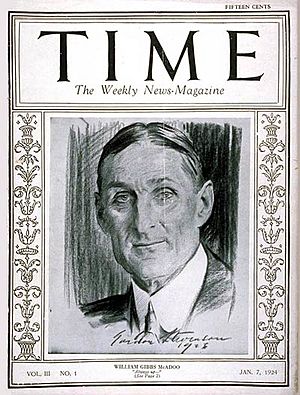
When the United States entered World War I in April 1917, McAdoo was put in charge of the country's railroads. He held this position until the war ended in November 1918.
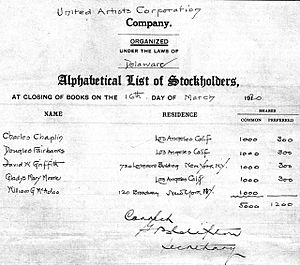
In March 1919, after leaving the government, McAdoo helped start a law firm. This firm worked for the founders of United Artists, a movie studio. McAdoo owned 20 percent of the company's common shares. The famous founders like Mary Pickford and Charlie Chaplin also owned parts of the company. In 1922, McAdoo left the firm and moved to California to focus on politics.
McAdoo ran for the Democratic presidential nomination twice. He lost to James M. Cox in 1920 and to John W. Davis in 1924. Even though he led in the first round of voting both years, he couldn't get enough support to win. During his 1920 campaign, McAdoo supported ideas like injury pay, unemployment insurance, and the eight-hour workday.
His 1924 presidential campaign was hurt by news that he had received money from an oil businessman involved in the Teapot Dome scandal. McAdoo had returned the money once he learned about the scandal. At the 1924 Democratic convention, McAdoo received support from the Ku Klux Klan. He refused to say if he was a member, which caused many Catholic voters to turn against him. After many rounds of voting, John W. Davis won the nomination.
McAdoo served as a Senator for California from 1933 to 1938. He lost his re-election bid in 1938. His second wife divorced him in 1934. Two months later, in July 1935, the 71-year-old McAdoo married Doris Isabel Cross, a 26-year-old nurse.
Death
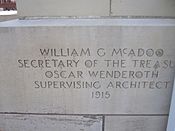
William Gibbs McAdoo passed away on February 1, 1941. He had a heart attack while traveling in Washington, D.C. He was buried in Arlington National Cemetery in Virginia.
Legacy and Impact
McAdoo was a very charming and energetic person. He was optimistic and confident. He was known as a smart businessman who supported ideas like breaking up large companies, which was popular during the Progressive movement. His work as Treasury Secretary during World War I greatly expanded his influence. He had a strong say in many important government decisions that affected the entire economy.
In the 1920s, as the Democratic Party changed, McAdoo sided with rural areas, especially the South. He never openly supported the Ku Klux Klan, but he also didn't speak out against it. This caused a big fight for the 1924 presidential nomination.
In 1932, he helped Franklin D. Roosevelt get the Democratic presidential nomination. McAdoo supported Roosevelt's "New Deal" programs. However, he became less comfortable with some of the changes happening in California in the mid-1930s. He lost his Senate re-election in 1938.
McAdoo has been shown in movies and books. He was played by Vincent Price in the 1944 movie Wilson. He is also a character in the novel Sunnyside, where he encourages Charlie Chaplin to help with war fundraising.
The town of McAdoo in Texas is named after him. A restaurant in New Braunfels, Texas, also carries his name.
McAdoo is remembered for some famous quotes. He once said, "It is impossible to defeat an ignorant man in an argument." He also described Warren G. Harding's public speeches as "an army of pompous phrases moving over the landscape in search of an idea."
Selected Works
- William G. McAdoo, The Challenge. New York: Century Co., 1928.
- William G. McAdoo, Crowded Years: The Reminiscences of William G. McAdoo. Boston: Houghton Mifflin Company, 1931.
- Craig, Douglas B. Progressives at War: William G. McAdoo and Newton D. Baker, 1863–1941. Baltimore: Johns Hopkins University Press, 2013.
 | Percy Lavon Julian |
 | Katherine Johnson |
 | George Washington Carver |
 | Annie Easley |



